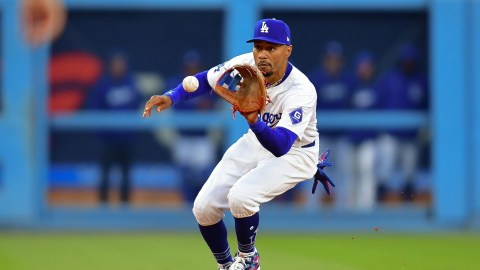An asterisk. Few symbols have the power to stir up as much debate as that little star-like object that hovers above the "8" on your standard American keyboard.
In baseball in particular, the asterisk has been thrown around in argument to argument, especially when it comes to the game's Steroid Era. Yet, there has never been and never will be a definitive answer on whether we should use the symbol to denote a certain set of circumstances, such as the use of performance-enhancing substances, mostly because so much of the debate is subjective.
But Melky Cabrera's 50-game suspension is unique. Not because it involves one of this year's best hitters (based on batting average) or because it could go a long way toward crushing the Giants' playoff aspirations, but because it presents a rare situation in which an asterisk actually seems undoubtedly logical.
Some baseball fans will argue that all records set in the Steroid Era should be accompanied by an asterisk, but that opens up a gigantic can of nightcrawlers. Who did this because of that? Who stuck what where? Did he really do X? Did X help him accomplish Y? You name it, you can debate it. And for that, asterisks in those instances should be left out of MLB record books, with mental notes serving in their place. The Steroid Era came about largely through the faults of everyone. Players used, MLB snoozed and fans enthused. But now, rather than accuse and muse, we should all just defuse. (OK, I'll stop.)
Beyond the Steroid Era, the name of the game is a bit different. Major League Baseball seems to be trying, despite what BALCO founder Victor Conte might tell you, to clean up the sport. The current drug testing policy isn't fool-proof, meaning there still could be those drug users who fly under the radar and never face serious repercussions from the league, but those who do earn lengthy bans (much like Mr. Cabrera) at least open themselves up to a much more rational asterisk debate.
In the case of a player in today's game who is found to have used performance-enhancing drugs, and subsequently serves a suspension, why not label his season with an asterisk? Going back and trying to dictate the use of PEDs in past eras would require authoring revisionist history, but duly noting going forward that a player was convicted of using PEDs doesn't seem all that crazy. That's especially true in the case of Cabrera, whose suspension has two rather interesting side notes.
Cabrera, of course, was named this year's All-Star Game MVP. In the grand scheme of things, with the Midsummer Classic becoming less and less meaningful (regardless of what Bud Selig and his "This One Counts" slogan will tell you), Cabrera's award probably doesn't mean a whole lot. But in terms of integrity of the game, something baseball fans can still agree shouldn't be compromised, the award should at least be marked with one of those ever-controversial asterisks.
We know Cabrera used PEDs this season so, with the subjective debate about how much of an impact those drugs had aside, the Giants outfielder deserves to be punished for bringing home some illegitimate hardware. We'll all be well-versed on Cabrera's suspension, but those looking back in 30 years shouldn't be able to open up a book and look at the list of All-Star Game MVPs without realizing what other, less glorious feat Cabrera accomplished back in 2012.
Again, an All-Star Game MVP Award is hardly the be-all and end-all of sporting achievement, but recognizing a PED user with an award during a season in which he was convicted and suspended seems rather strange. In fact, we're now forced to hold our collective breath the remainder of the regular season as Cabrera sits in a position to potentially steal a batting title.
Andrew McCutchen current leads the National League in batting, and could very well keep up his current pace and finish well above Cabrera's .346 mark that will now stand for the rest of the season because of his suspension. However, if everyone else in the NL dips below .346, the batting title could still begrudgingly be handed over to Cabrera at season's end.
It's hard to explain, but basically Cabrera fell one plate appearance short (with 501) of automatically qualifying for the batting crown. He could still win the batting title, though, if his average would hold up as the best with the one plate appearance added. The following description from MLB.com does a nice job of summing up the strange predicament.
"To explain, Cabrera is 159-for-459, good for a batting average of .3464 when carried to a fourth decimal. If Cabrera were theoretically given one more at-bat, 159-for-460 comes to an average of .3456. Both figures round out to .346. If no qualifying batter has hit for a higher average, Cabrera would be the NL batting champion."
Now, keep this all in perspective. Throw out the fancy, schmancy formulas, and it's the concept that's alarming. A man who used a performance-enhancing substance could walk away from the season in which he used with a batting title. An All-Star Game MVP is one thing, but a batting title is a pretty impressive accomplishment for any big league ballplayer, and therefore letting Cabrera walk away with the crown is essentially a slap in the face to the rest of the league. Hopefully, it doesn't come to that, but if it does, get out your best asterisk-writing pen.
Cabrera already cheated baseball out of one award this season, but the looming possibility shows there's a need for action. And sitting there just waiting is the asterisk, finally deserving of its day in the sun.





